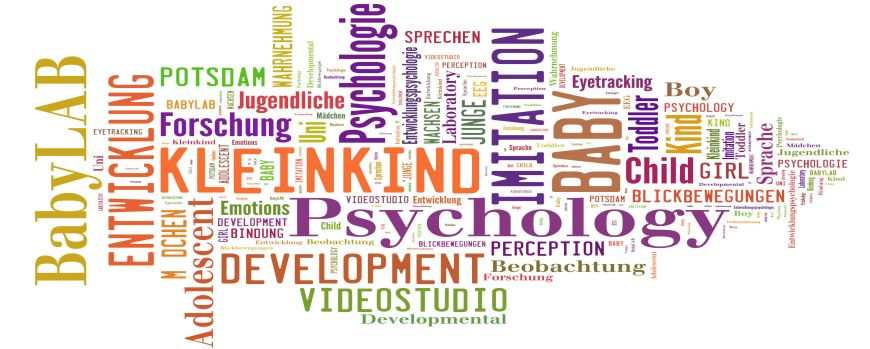Professur für Entwicklungspsychologie: Willkommen!
Die Entwicklungspsychologie untersucht altersbezogene Veränderungen des Verhaltens und Erlebens von Menschen, die über die gesamte Lebensspanne hinweg auftreten. In verschiedenen Entwicklungsbereichen – z.B. kognitive/geistige, emotionale, soziale Fähigkeiten – stellen sich Forschungsfragen danach, in welchem Lebensalter und wie genau die Veränderungen auftreten, und welche Faktoren (z.B. im Individuum selbst oder in dessen Umwelt) die Ursache dafür sind.
Die aktuellen Forschungsschwerpunkte in unserer Abteilung liegen in der empirischen Untersuchung
- der (sozial-)kognitiven Entwicklung im Säuglingsalter und in der frühen Kindheit (v.a. Handlungsverständnis, Imitationslernen, Steuerung intentionaler Handlungen),
- der Developmental Cognitive Neurosciene (neuronale Korrelate der frühkindlichen kognitiven Entwicklung),
- des Zusammenhangs von kognitiven Fähigkeiten (v.a. exekutive Funktionen, Theory of Mind) und Entwicklungsproblemen in der mittleren Kindheit,
- der Entwicklung im Jugendalter und im beginnenden Erwachsenenalter,
- des Zusammenhangs von Lernen und Entwicklung.
Als Forschungsmethoden kommen unter anderem Blickbewegungsanalysen, EEG, systematische Verhaltensanalysen und Videotechnik zum Einsatz.
Projekte
Labore
Aktuelle Publikationen
Brandt, A., Gericke, C., Bondü, R., & Elsner, B. (2025). Stability and change of cool and hot executive functions across middle childhood and early adolescence: A person-oriented longitudinal perspective. Developmental Psychology, 61(12), 2344–2361. https://doi.org/10.1037/dev0001980
Brandt, A., Bondü, R., & Elsner, B. (2025). Latent profiles of executive functioning predict adolescent styles of social information processing. Journal of Cognition and Development, online first publication, 1-27. https://doi.org/10.1080/15248372.2025.2566071
Trouillet, L., Bothe, R., Mani, N., & Elsner, B. (2025). Goal saliency and verbal information influence the imitation of movements and goals in 20-to 22-month-old toddlers. Infant Behaviorand Development, 79, 102063. https://doi.org/10.1016/j.infbeh.2025.102063
Vanoncini, M., Hoehl, S., Elsner, B., Wallot, S., Boll-Avetisyan, N., & Kayhan, E. (2025). Individual differences in infants’ speech segmentation performance: The role of mother-infant cardiac synchrony. Infancy, 30:e70020. https://doi.org/10.1111/infa.70020
Tünte, M. R., Hoehl, S., Wunderwald, M., Bullinger, J., Boyadziheva, A., Maister, L., Elsner, B., Tsakiris, M., & Kayhan, E. (2025) Respiratory and cardiac interoceptive sensitivity in the first two years of life. eLife, 12, RP91579. https://doi.org/10.7554/eLife.91579.4
Rauers, A., Knitter, L. A., Studtmann, M., & Riediger, M. (2025). Tearjerkers may leave some eyes dry – Emotional reactivity to film clips from adolescence to old age. British Journal of Developmental Psychology, https://doi.org/doi:10.1111/bjdp.70002
Kliesch, C. (2025). Postnatal dependency as the foundation of social learning in humans. Proceedings of the Royal Society of London B: Biological Sciences, 292:20242818. http://doi.org/10.1098/rspb.2024.2818
Vanoncini, M., Kayhan, E., Elsner, B., Wunderwald, M., Wallot, S., Hoehl, S., & Boll-Avetisyan, N. (2025). Individual differences in infants' speech segmentation performance: The role of mother-infant cardiac synchrony. Infancy. https://doi.org/10.1111/infa.70020

